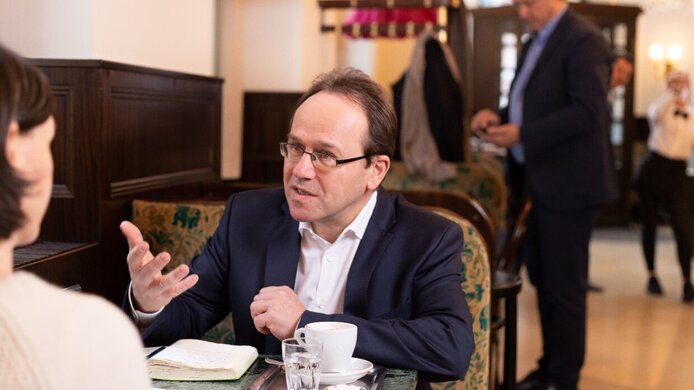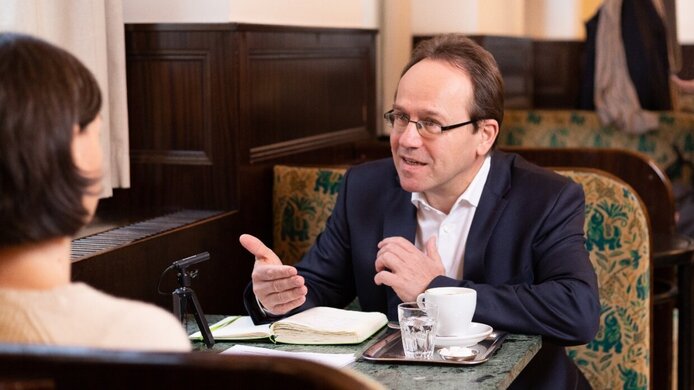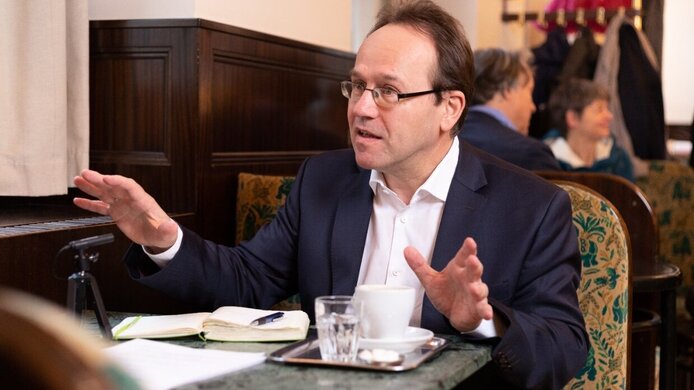“We have such incredible potential”

FWF: When you took office a couple of years ago, you urged that Austria should switch on the “research turbo”. Is the country on the right track now in the area of research and development?
Klement Tockner: The direction is definitely right, but Austria still has the brakes on when it comes to basic research. Greater security as regards financial planning would release those brakes and enable even more researchers to be ranked among the world’s best. The new Research Funding Act will provide a boost.
FWF: A recent analysis by the OECD again confirmed what we have long known: the FWF’s tight funding budget is hindering scientific excellence in Austria. What needs to happen for policy-makers to take this message on board?
Tockner: The message has already reached policy-makers. We have good meetings, things are moving, even though there is still scepticism as regards awarding research funds competitively. The share of competitive funding must be increased in order to improve overall quality and enhance cooperation between research teams. Germany’s Pact for Research and Innovation shows how it could be done. Funds for non-university research institutions were increased by five percent each year between 2005 and 2015. The Leibniz Association, for instance, awarded half its funding on a competitive basis. This brought a huge boost in quality.
FWF: The universities would like to see the FWF's budget tripled. What impact could that have?
Tockner: To be able to offer researchers in Austria excellent framework conditions in the future, we need three steps: First, a consolidation of FWF funding. This year we will have around EUR 270 million at our disposal for funding grants, an increase of almost 90 million since 2016. Secondly, we need a clear growth path for the next five to ten years, with an increase of around 10 percent per year, in order to move closer to the level of leading research countries. Thirdly, we are making joint efforts with the research institutions to work out uniform rules for overheads in order to strengthen not only our researchers but also our institutions through quality-driven competition. We can see that our funding requirements are increasing every year: 360 new professorships and tenure-track positions are being created at the universities, the CEU (Central European University) is coming to Vienna and IST Austria is growing. If we can no longer approve excellent proposals, frustration will increase and top researchers will not stay in the country.
FWF: Policy-makers profess a commitment to strengthening basic research. A research summit is scheduled for the spring. So, the odds look good?
Tockner: The government has the objective of seeing Austria among the most innovative research countries in Europe. The recipes for that are well known; the research summit is about thinking big and doing more than just tweaking individual aspects. And yes, I think the odds are definitely good.
FWF: The FWF strategy paper for the years 2019 to 2021 contains numerous projects that are in line with the recommendations of the OECD report. The FWF is setting the course for implementing the forthcoming Excellence Initiative. What are the cornerstones of the initiative?
Tockner: The Excellence Initiative has the potential to heighten research profiles throughout Austria so it can continue as a global leader in established areas. On the other hand, such an initiative paves the way for opening up new fields of research where one can strive for a global pioneering role. This, in turn, means being attractive to the best researchers in the world. Excellent framework conditions are required to achieve that, especially when it comes to career support, for example in the form of doctoral programmes or clear tenure-track models. An Excellence Initiative accordingly fosters sustainable changes in the research system, which will pay off in many ways in the medium and long term.
FWF: In the lead-up to the government's research summit in the spring of this year, a group of experts, of which you are a member, is working on a draft of the Excellence Initiative on behalf of the Ministry of Science. How are the meetings coming along?
Tockner: We are making good progress, the expert group is working smoothly and very ambitiously on a concept that is based on international success stories and provides a basis for political decisions. There is consensus within the group on the direction to be taken. We're also exchanging ideas with the Ministry. As far as the basic conception is concerned, we see the recommendations of the team as being in line with the general political will.
FWF: How will Austria benefit from this?
Tockner: Austria can take a big step closer to the world's leading research nations. In the long term, this will give rise to a research environment that produces the best researchers and attracts them from all over the world. Universities and research institutions will have higher standing internationally. And companies will move to Austria to profit from the growing innovative momentum. Excellence attracts excellence, not only in science, but also in the world of business and industry.
FWF: What if the Excellence Initiative does not materialise?
Tockner: The framework conditions for researchers would remain critical. If the Initiative is not implemented now, then we will have missed the boat for the next ten years, as all those concerned agree. All countries that are strong in research have such funding programmes and Austria can move closer to the world's leading forward-looking science nations only if it pursues an ambitious Excellence Initiative.
FWF: You have set an advance goal of having at least two Austrian universities among the top 100 worldwide. The Initiative is to start in 2020. How long will it take to achieve that goal?
Tockner: I am convinced this will be possible in less than ten years. The researchers at the universities and research institutions demonstrate incredible potential; they do excellent work and advance scientific progress in Austria.
FWF: There is a lot of catching up to do if the rankings are to be believed. There is no Austrian university among the world's one-hundred best, and only one figures on the list within Europe. The Netherlands, a country that backs competitive funding, has 13 universities, all of which belong to the top European universities.
Tockner: The list includes universities that are not well known, such as Tilburg University. At the same time, the Delft University of Technology or the Wageningen University are world leaders; their focus is comparable to that of an Austrian university of technology or the Vienna University of Natural Resources and Applied Life Sciences. That means it is achievable for us as well. Diversity doesn't have to mean that you can't feature among the top ranks, but you have to harness it to your benefit, otherwise it leads to fragmentation and isolation - that's a typical downward spiral.
FWF: Innovation is also on the agenda in the FWF's programme portfolio, for instance in the area of career promotion. It is striking that the programmes for the advancement of women have been discontinued. Don’t we need encouragement specifically directed at women anymore?
Tockner: Quite the contrary -- we are strengthening the career programmes as a whole and especially the promotion of women, both financially and in terms of professional reputation. In the future, young female researchers will be able to submit their research proposals on an ongoing basis. In the past, the relevant Firnberg Programme issued a call for proposals only once a year. We intend that, as of 2020, the Richter Programme for women aiming for a sustainable university career, which builds on the Firnberg Programme, should open up the same opportunities as the START Prize, which usually involves a tenure-track position. In this new programme line for “advanced stage postdocs”, at least 50 percent of the resources are earmarked for women. We expect that this will result in in an even stronger focus on women and their advancement.
FWF: The ratio of women to men when applying for funding is 1:3. On the other hand, the funding opportunities for women are almost as great as for men. Is there a need for communicating this more clearly?
Tockner: It's hard to achieve that in isolation. The research institutions are called upon to pitch in here just as we are doing as a funding organisation. However, I am convinced that strengthening career programmes will send an important signal to the scientific community.
FWF: Another new element in the funding programme are cooperation formats to strengthen innovative and interdisciplinary research. Is this based on role models from other countries?
Tockner: There are some of those, but only a few. We are pioneers in this regard. Many of the major issues have become so complex that they can be debated and dealt with only in inter- and transdisciplinary teams. The current boundaries between disciplines were partly drawn artificially and no longer reflect the dynamics of the science landscape. We want to open up these structures and support new disciplines as they emerge at the periphery of traditional ones. Another goal is to extend knowledge production into society at large. In this field we sense fascinating impetus and new perspectives.
FWF: Applying for support under such a programme stimulates creative thinking.
Tockner: Submitting such applications is indeed an enormous intellectual challenge. However, they produce new ideas that can lead to outstanding and unexpected results. And at the end of the day, such teams bring together particularly creative minds, resulting in momentum that benefits the institutions as well and which must therefore be supported.
FWF: In order to raise the profile of basic research among stakeholders and in society, plans include establishing a foundation. Why does the FWF want money from the private sector?
Tockner: The foundation sends an important signal at the national level and will continue to stimulate science fundraising in Austria. Science-related foundations of the kind that already exist in many countries stimulate awareness of the importance of research in the public sphere. We would like to foster this cultural change in Austria as well. Foundations can also be more courageous and experimental in their support.
FWF: Doesn't this expose the FWF to the influence of particular interests?
Tockner: The foundation is subject to a strict code of conduct. There are guarantees for independence in the decision-making process and the awarding of grants, just as we already have in several not-for-profit foundations. The grants will benefit exceptional researchers 100 percent.
FWF: You were recently confirmed as president of the FWF until 2024. What achievement would you like to look back on after your second term in office?
Tockner: If we succeed in overcoming geographical, discipline-related and institutional boundaries, we will have achieved a great deal. This means that we must be in a position to promote openness - also as regards the application side of research - and continue to set high quality standards that make us a role model for others. And if we succeed in doubling the funds allocated through the FWF - and if the ambitious Excellence Initiative programme takes off at full speed - then we can provide the best researchers with the kind of support they so urgently need.
FWF: What are your biggest learnings as the manager of a research funding institution so far?
Tockner: It's important to build up a basis of trust with policy-makers and research institutions, but to do that at arm's length. Every day I am made aware of the unbelievable potential that exists in Austria. Sometimes it’s almost painful to see how much there is that could be done but which ultimately fails to be implemented. It must simply be clear that a strong research landscape is a basic prerequisite for economic success. The successful companies settle where the best research facilities are - and not the other way round. Politicians must communicate this to the public in an appropriate manner. And we just need far greater courage!
Klement Tockner has been President of the Austrian Science Fund FWF since 2016. In December 2018, he was reappointed ahead of time by the FWF's Supervisory Board for a further term of office running until 2024. Tockner is a water ecologist and holds a professorship for aquatic ecology at the Freie Universität Berlin. For many years he headed a research group at ETH Zurich and, more recently, served as director of the Leibniz Institute for Freshwater Ecology and Inland Fisheries (IGB) in Berlin for nine years.







